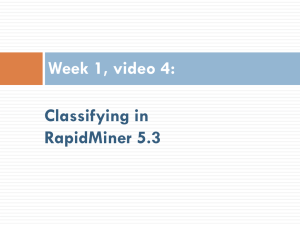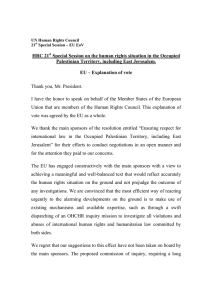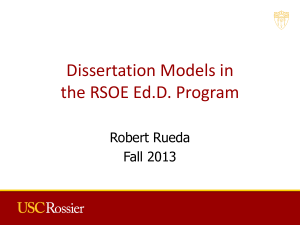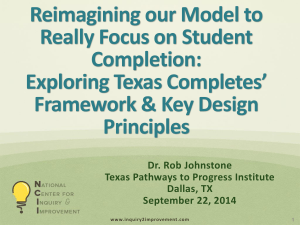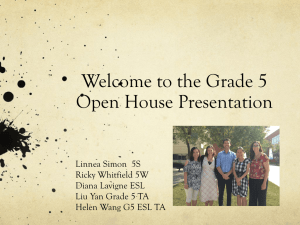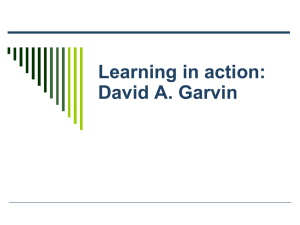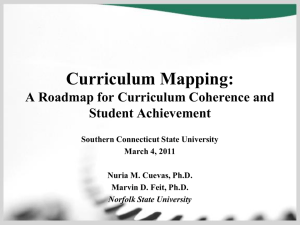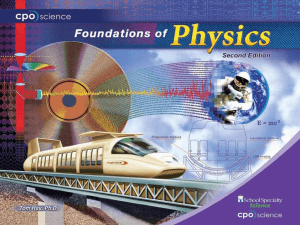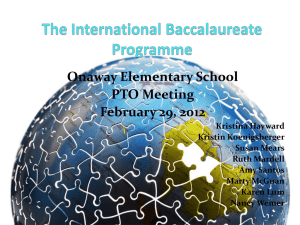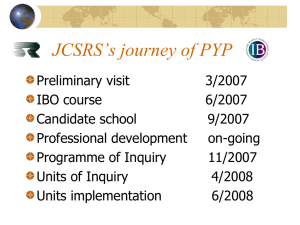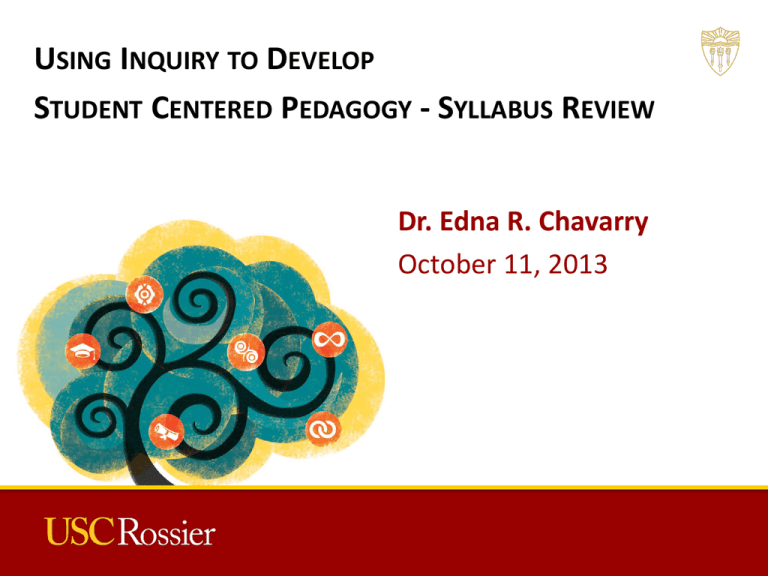
USING INQUIRY TO DEVELOP
STUDENT CENTERED PEDAGOGY - SYLLABUS REVIEW
Dr. Edna R. Chavarry
October 11, 2013
What is inquiry?
CUE’s Inquiry Model
Data
Gaps
Inquiry
into
Causes
Informed
Interventions
Evaluation
of
Interventions
Deficit-Minded Knowledge
Lack of…
Motivation
Direction
Engagement
Discipline
Interaction
with Faculty
Time
Study Skills
Commitment
4
USC Rossier School of Education
What are our inquiry perspectives?
Equity Mindedness
Cultural Inclusivity
Equity-Minded Knowledge
Race Conscious
Minding Equity Gaps
Validation
Counter-Normative
Narratives
Institutional Effort
Cultural Effort
Institutional Responsibility
6
What function does a
Syllabus Serve
Contract (Altman, 1999; Matejka & Kurke, 1994)
Logistical – outlining the course of study (Stewart, 2004)
Introduction to the professor (Garavalia et.al, 1999)
Goals for the day
syllabuscommunicates
communicates––explicitly
1)
1)Become
Becomeaware
awareof
ofwhat
whatyour
yoursyllabus
explicitly
implicitly––to
and
andimplicitly
toyour
yourstudents.
students.
2)Conceptualize
Conceptualizethe
therole
roleof
offaculty
facultymembers
membersas
asagents
agentsof
ofchange
change
2)
capable
capableof
ofmaking
makingaadifference
differenceininstudents’
students’educational
educational
achievement.
aspirations
aspirationsand
andachievement.
3)
3)Learn
Learnabout
aboutstrategies
strategiesto
tomake
makeyour
yoursyllabus
syllabusaaroadmap
roadmapto
to
learningand
andfamiliarize
familiarizethem
withthe
guide
guidestudents
studentslearning
themwith
the“invisible”
“invisible”
practices
practicesof
ofacademic
academicsuccess
successthat
thatyou
youlearned
learnedas
asaacollege
college
student.
student.
Focus on improving Hispanic student outcomes
SYLLABI REVIEW
Change through Inquiry
Inquiry:
A meaning-making process that
moves a learner from one
experience into the next with a
deeper understanding of its
relationship with and connections
to other experiences and ideas.
CUE’s Document analysis protocol
prompts faculty to reflect on what
they communicate to students (via
documents like syllabi). Culturalinclusive prompts in the protocol
include:
Does this document communicate …
• respect for students?
• Expectation that learning takes
place in authentic application to
and engagement with real-world
problems
• Expectation that student success
will be a collaborative effort among
the students and faculty?
Document the
inquiry process &
findings.
No
calendar of
activities
Authoritarian
SYLLABI REVIEW
TYPICALLY CONTAINED
DID NOT CONTAIN
•Course description
•Expected learning outcomes
•Faculty contact information/office hours
•Student expectations
•Course content
•Encouraging tone
•Attendance policy
•Calendar of activities
•Academic dishonesty policy
•Information regarding resources for
•Withdrawal policy
academic & other support
•Grade breakdown
•No evidence for instructional
•Condescending/punitive tone
variety/culturally inclusive activities
Syllabi Review
Pg. 4
LMC Puente English 90
Why is it Equity-Minded?
Reading materials for the course are
culturally relevant—”And the Earth Did Not
Devour Him” by Tomás Rivera
Copyright 2011. All rights reserved.
USC Rossier School of Education
Equity-Minded Syllabus
LMC Puente English 90
Why is it Equity-Minded?
Provides a step-by-step
explanation of how to use
Blackboard
Copyright 2011. All rights reserved.
USC Rossier School of Education
Equity-Minded Syllabus
LMC Puente English 90
Why is it Equity-Minded?
Provides a welcoming and
and supportive tone—
”Communication with your
instructors and your
counselor will help you feel
supported by the program.
You can count on us to help
you work it out. No problem
is too big or too small.
Copyright 2011. All rights reserved.
USC Rossier School of Education
Equity-Minded Syllabus
LMC Puente English 90
Why is it Equity-Minded?
Provides resources for
academic assistance
Copyright 2011. All rights reserved.
USC Rossier School of Education
English Syllabi prior to Doc. Review (2005)
Pg.
6
English Syllabi changed to communicate respect for students (2006)
English Syllabi communicating that student success will be
supported by a collaboration between students and faculty:
Pg.
7
Assignment from a Modified Syllabus of an Introductory
Algebra Course at a Community College
What is inquiry?
Pg.
8
CUE’s Inquiry Model
Data
Gaps
Inquiry
into
Causes
Informed
Interventions
Evaluation
of
Interventions
Syllabus Review –
Action Planning
Pg.
9
Questions and discussion
How might an inquiry process in
general, and the inquiry tools
more specifically, advance work
on your institution’s focal area?
University of Southern California
Rossier School of Education
Waite Phillips Hall, Suite 702
Los Angeles, CA 90089
Phone: (213)740-5202
Fax: (213)740-3889
E–mail: rsoecue@usc.edu


